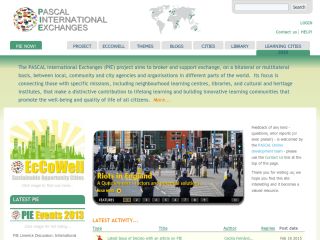Celebrating the life and work of Sir David Watson -Green Templeton College, Oxford 3 June 2015
As PASCAL Website users and many members of PASCAL anyway well know, David was an outstanding person and a leading global-local advocate of university engagement and of useful and relevant education for the community and for society generally. Chair of the UK universities continuing education organisation UALL during several years of his long service as Vice-Chancellor of Brighton, and an active participant in the work of NIACE England and Wales, he was one of the national adult continuing education community, always looking wider and outward at what education was good for, and how. From Brighton he took a Chair at the London Institute of Education, then becoming Principal of Green Templeton until his sudden death in February 2015.
The very large celebratory gathering, and the reflections, at Oxford mirrored the scale and diversity of his contributions and the universality of affection in which he was held. People came from many of his different walks of academic and community life. Particularly striking was the diversity of his public and also personal roles and contributions: not only in his family, home town and country, but globally. The breadth and depth of his reach at all levels was extraordinary.
Much was said. Much more could be added. There was for example no reference to his central role in conceiving that now significant and influential global force for university engagement with its wider world, the Talloires Network. For David it was not just ‘the university’, but the great range of universities in different countries. David, more than anyone, brought home the importance of different kinds of university contributions to social good in different circumstances, and of HE systems as well as single institutions. He was scathing about the formation of university Groups, or as he called them Gangs, for their self-seeking destructive competitiveness. No less significant, a lesson for our modern ‘leaders’, was his capacity to persuade and inspire by his warmth, and to lead by consistent sustained example. This integrity resonated through the ninety minutes of testimony. David won respect and admiration as well as warm affection in many public and private circles. His was leadership by deed no less than by word.
Fittingly, the opening soliloquy after introductions by the College Chair and the Acting Principal was by another influential leader of the ‘HE policy community’, thrice-VC Sir Graeme Davies, a former HEFCE Chief Executive with whom David served as was a Council member. Sir Graeme was generous in his praise, making repeated reference to David’s work for UALL: a nice commendation of the importance of our kind of work in PASCAL as by UALL as well of David himself.
What emerged for me? Certainly David’s warmth and charm, his intelligence and integrity. None of this needed the reminder of so unforgettable a person; but it also revealed the breadth of his interests, expertise and influence. He was truly a Renaissance man. In an age of sometimes extreme specialisation, when digging ever deeper hides from the labourer the wider skies, the bigger questions and the larger truths, Sir David Watson remains a symbol of what at its best being fully human means. It also gives substance to the adage ‘if you want a job done, give it to a busy person’.
Chris Duke
 Printer-friendly version
Printer-friendly version- Chris Duke's blog
- Login to post comments
- 355 reads






